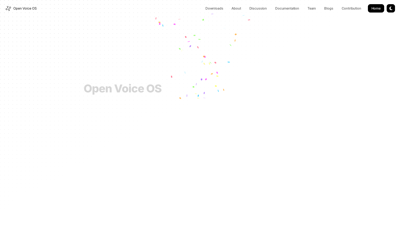Open Voice OS is an innovative, community-driven, open-source voice AI platform designed for creating custom voice-controlled interfaces across various devices. With a strong emphasis on privacy and security, it leverages natural language processing (NLP) and offers a customizable user interface. Whether you're a developer looking to experiment with voice technology or a hobbyist wanting to build your own smart speaker, Open Voice OS provides the tools and resources you need to get started. Join a vibrant community of developers and enthusiasts dedicated to making cutting-edge voice assistance technology accessible to everyone.
OVOS
Key Features of Open Voice OS
-
Community-Driven Development
Open Voice OS thrives on contributions from developers worldwide, making it a collaborative platform for voice AI innovation. This community-driven approach ensures continuous improvement and the introduction of experimental features. -
Multi-Platform Compatibility
Whether you're using embedded headless devices or single-board computers, Open Voice OS is designed to work seamlessly across various platforms. This flexibility allows users to build DIY smart speakers and other voice-controlled devices. -
Experimental Features
Open Voice OS is a playground for developers to test and implement experimental features before they are integrated into mainstream Linux-based voice assistant projects. This fosters innovation and rapid development. -
Easy Installation
Installing Open Voice OS is straightforward, with options for both Docker and Python environments. This accessibility makes it easy for developers of all skill levels to get started quickly. -
Offline Functionality
By default, Open Voice OS can operate without an internet connection, allowing users to access certain skills offline. This feature enhances privacy and usability in various scenarios. -
Extensive Documentation
Comprehensive documentation is available to guide users through installation, development, and contribution processes. This resource is invaluable for both new and experienced developers. -
Contribution Opportunities
Open Voice OS encourages community involvement through testing, bug reporting, skill creation, and code contributions. This collaborative spirit helps improve the platform continuously. -
Privacy and Security Focus
With a strong emphasis on user privacy, Open Voice OS ensures that voice data is handled securely, making it a trustworthy choice for voice AI applications.
Frequently Asked Questions about Open Voice OS
How did Open Voice OS start?
Open Voice OS originated as MycroftOS. Over time, contributions from the Mycroft community led to its rebranding to avoid trademark issues. It now serves as an enhanced reference fork of Mycroft-core, providing additional functionality.
What is the relationship between Open Voice OS and Mycroft?
Both projects are independent. Open Voice OS initially wrapped Mycroft-core but has since evolved to include its own features while maintaining compatibility with Mycroft.
Does Open Voice OS work offline?
Yes, Open Voice OS can function without an internet connection. While some skills may require online access, many can be used entirely offline, enhancing privacy and usability.
How can I contribute to Open Voice OS?
Contributions are welcome in various forms, including testing, bug reporting, documentation, and code development. The documentation provides guidance on how to get involved.
Where can I find more information?
For more details, check out the Full FAQ or reach out through the community channels.
